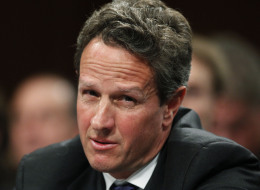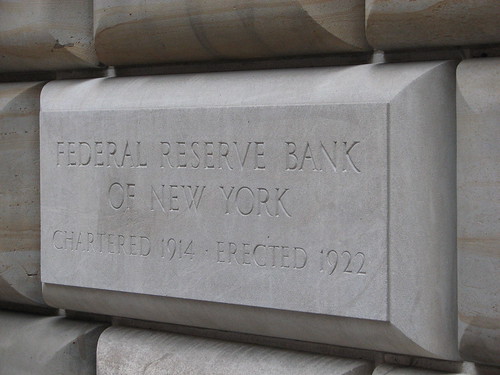
=====
Hi Team!
*? 2 ALL:
GEITHNER'S NY FED
PUSHED AIG TO KEEP
SWEETHEART DEALS SECRET -

Shahien Nasiripour reports:
"The sordid tale unfolds in a series of e-mails between the company and the New York Fed obtained by Rep. Darrell Issa (R-CA), the ranking member of the House Committee on Oversight and Government Reform, and first publicly disclosed by Bloomberg News.
Taxpayers have committed about $182 billion to AIG. The under-regulated firm developed and sold complicated derivatives products without having adequate capital in place if those bets went bad, which they eventually did. The firm nearly single-handedly wrecked the entire financial system.
After the firm was given a taxpayer-funded backstop, one of its most controversial acts was to repay banks at 100 cents on the dollar for what was by that point nearly worthless insurance the banks had bought from AIG, known as credit-default swaps.
"A brutal report issued in November by a government watchdog disclosed that AIG had actually been trying to negotiate better terms with the banks until - guess what? -- the New York Fed stepped in. The report held Geithner personally responsible, and led to renewed questions about his fitness for the job.
"Now it turns out Geithner's people told AIG to delete references on draft regulatory filings to the sweetheart deals. And AIG then excluded any mention of them in its December 2008 filing with the Securities and Exchange Commission, keeping the information hidden from investors and the public."
Geithner's New York Fed pushed AIG to keep sweetheart deals secret - what are your comments?
Greg Dempsey
http://groups.
Voice Of The People
=======
Geithner's New York Fed Pushed AIG To Keep Sweetheart Deals Secret
"The matter is the subject of an 'ongoing review' by the Office of the Special Inspector General for the Troubled Asset Relief Program (SIGTARP), communications director Kristine Belisle said in an e-mail to the Huffington Post. SIGTARP is headed by Neil M. Barofsky, a former federal prosecutor.
"It appears that the New York Fed deliberately pressured AIG to restrict and delay the disclosure of important information to the SEC," Rep. Darrell Issa said in a statement. "The American taxpayers, who own approximately 80% of AIG, deserve full and complete disclosure under our nation's securities laws, not the withholding of politically inconvenient information.
"This news ought to serve as a cautionary tale to those who advocate giving the Federal Reserve even more power over the U.S. economy. The lack of transparency and accountability is disturbing enough, but the outstanding question that remains is why the [New York Fed] didn't fight for a better deal for the American taxpayer. Clearly, the New York Fed wanted to suppress details and limit disclosure of the counterparty deal from the American people -- the only question is why?"
In a March 12, 2009, e-mail, Kathleen Shannon, an AIG in-house lawyer and senior vice president, told AIG executives that the firm needed to come up with a reason, per the New York Fed, for why it wasn't going to publicly disclose details regarding payments to counterparties.
"In order to make only the disclosure that the Fed wants us to make...we need to have a reasonable basis for believing and arguing to the SEC that the information we are seeking to protect is not already publicly available," Shannon wrote in an e-mail sent at 10:55 p.m. on March 12.
Around noon the next day, a New York Fed official, Alex Latorre, e-mailed a colleague, Sarah Dahlgren, writing: "...I understand that the company is still deliberating on the proposal surrounding the disclosure. It is important that they reach consensus quickly."
The power of the Fed in forcing AIG to keep these details secret cannot be understated. As detailed in journalist Andrew Ross Sorkin's recent book on the bailout, "Too Big To Fail", AIG officials had been pleading with the New York Fed for assistance throughout the crucial first weeks of September 2008 before the firm was finally given a taxpayer-funded bailout. The firm's pleadings were largely ignored by Geithner, who was preoccupied with Lehman Brothers and other Wall Street broker-dealers like Merrill Lynch, Morgan Stanley and Goldman Sachs. The firm owes the Fed its survival.
Wall Street firms like Goldman Sachs, Merrill Lynch and Wachovia got full value for their derivatives contracts with AIG, and taxpayers got stuck with the bill. In total, $27.1 billion of public money was transferred to companies that did business with AIG. It was largely seen as a "backdoor bailout" for firms like Goldman.
Instead of bargaining with AIG's numerous counterparties to resolve its billions of dollars in souring derivatives contracts, Geithner's team ended up having AIG pay top dollar for toxic assets -- "an amount far above their market value at the time," the November report noted. It described how the team led by Geithner failed nearly every step of the way.
And consider the timing of the newly discovered action. Reports first emerged that Geithner was being tapped for the Treasury secretary post on Nov. 21, 2008; the Senate confirmed his nomination on Jan. 26. Details of AIG's 100-cents-on-
The Treasury's response this morning is, essentially, no harm no foul. Meg Reilly, a Treasury spokeswoman, released a statement: "In the transaction at the heart of this dispute... the FRBNY made a loan of $25 billion which is on track to be paid back in full with interest so that taxpayers will be made whole. Somehow that fact that the government's loan is 'above water' gets lost in all the consternation despite its mention on page 2 of the SIG-TARP report (and weekly updates on the FRBNY's web site."
Attachment(s) from Greg Dempsey
1 of 1 Photo(s)


First Posted: 01- 7-10 09:12 AM | Updated: 01- 7-10 02:26 PM